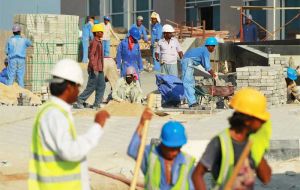MercoPress. South Atlantic News Agency
Headache for FIFA: Amnesty again blasts Qatar for rampant abuse of migrant workers
 Sherif Elsayed-Ali said ”urgent action is needed to ensure we do not end up with a World Cup tournament that is built on forced labor and exploitation.”
Sherif Elsayed-Ali said ”urgent action is needed to ensure we do not end up with a World Cup tournament that is built on forced labor and exploitation.”  AIi has consistently called for reform of the sponsorship or “kafala” system- which ties workers to their employers and encourages forced labor.
AIi has consistently called for reform of the sponsorship or “kafala” system- which ties workers to their employers and encourages forced labor. Qatar’s authorities are lagging severely behind on efforts to address the rampant abuse of migrant workers’ rights, Amnesty International said in a briefing published six months after the government announced a series of reforms to tackle exploitation ahead of the 2022 World Cup.
“No extra time: How Qatar is still failing on workers' rights ahead of the World Cup” sets out how the Qatari government has failed to reform the systems that facilitate the abuse of migrant workers and has made only minimal progress on a number of plans it announced in May 2014.
“Time is running out fast. It has been four years since Qatar won the bid to host the World Cup, putting itself in the global spotlight, so far its response to migrant labor abuses has not been much more than promises of action and draft laws,” said Sherif Elsayed-Ali, Head of Refugee and Migrants’ Rights at Amnesty International.
“Urgent action is needed to ensure we do not end up with a World Cup tournament that is built on forced labor and exploitation.”
The briefing analyzes the response of the authorities to nine key issues critical to the rights of migrant workers in Qatar. On five of these issues, there has been no progress, and only limited or partial progress was achieved in the other four areas.
“Despite making repeated promises to clean up its act ahead of the World Cup, the government of Qatar still appears to be dragging its feet over some of the most fundamental changes needed such as abolishing the exit permit and overhauling its abusive sponsorship system,” said Sherif Elsayed-Ali.
Amnesty International has repeatedly urged Qatar to cancel the exit-permit, a blatant violation of migrants’ rights that gives employers control over migrant workers’ movements and can lead to exploited migrants being trapped and unable to leave the country.
It has also consistently called for reform of the sponsorship or “kafala” system- which ties workers to their employers and encourages forced labor.
Amnesty International has highlighted exploitative practices in Qatar such as delays in payments of migrants’ wages, harsh and dangerous working conditions, poor living conditions and shocking details of forced labor and physical and sexual violence against domestic workers in two reports it issued last year.
Following an international outcry spurred by critical media reports and pressure from Amnesty International and other rights groups, the Qatari government appointed the law firm DLA Piper to investigate allegations of abuse.
In May 2014 DLA Piper made a series of recommendations to the government in a wide ranging report that also criticized the sponsorship system.
Shortly afterwards the Qatari government announced a series of reforms including proposals to amend the sponsorship system and the exit permit and to abolish a rule that prevents workers from returning to Qatar for two years after they have ended a contract.
In Amnesty International’s view, the announced reforms were a missed opportunity as they would not address the crux of the issues contributing to widespread abuse of migrant workers. Even these limited proposed reforms remain unfulfilled.
Additionally, the government’s moves since May to remove the major obstacles to workers trying to get justice and to address grave concerns regarding health and safety for construction workers have been inadequate.
“Six months later, only a handful of the limited measures announced in May have even been partially implemented. Overall the steps taken so far are woefully insufficient,” said Sherif Elsayed-Ali.
“By failing to act quickly to address the gaping holes in its human rights record, Qatar risks seriously damaging its credibility and calling into question its commitment to human rights.”




Top Comments
Disclaimer & comment rules-

-

Read all commentsWe should dump this lot of con men, FIFA is a disgrace.
Nov 13th, 2014 - 02:20 pm 0The Sherif bloke needs to send a few deputies in to kick a few arses to get things moving.
Nov 13th, 2014 - 05:44 pm 0They won't take any notice of being told, they have ignored four years so far and it's about time they moved their arses off the camels and did something.
Commenting for this story is now closed.
If you have a Facebook account, become a fan and comment on our Facebook Page!